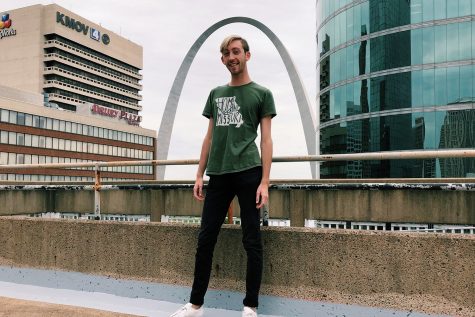The Sound of SLU this Semester
When Sophie Mueller and Mary Wilton, co-presidents of KSLU, are asked to describe the average KSLU member, they look at each other and laugh.
“Well I would say there’s a stigma that we are either very pretentious or just a very specific type – you know, rolling around in our jean jackets. Really it’s so diverse and everyone is very accepting,” said Wilton.
Mueller agreed when she shared how KSLU has allowed her to find community at SLU. “For me at least, it’s another form of self expression. Like I’m not a writer or an artist by any means, but when I send you a playlist, that’s how you know and that’s how I show that I care about you. I think KSLU is a lot of people who care about music and what it’s done for them and how it builds community.”
KSLU is SLU’s sole campus radio station, and it provides an open platform for students to DJ their own music and talk shows. Mueller and Wilton did concede that most KSLU members have a shared fashion style or aesthetic, akin to a fraternity or sorority. But at the end of the day, KSLU members all have their own unique music tastes.
In looking at what programming KSLU offered last year, you can see that’s true. Rock music offerings such as “Don’t Call me Punk” or jazz shows like “Citizen’s Arrest” were just a few threads that made up the vibrant fabric of KSLU’s schedule.
But if there is one thing that unites the wide variety of niche shows of KSLU, it is that many focus on “vibes” rather than genre. Shows such as “Unpeeled” or “Ambiguity” offer spaces where hosts can share whatever music has most recently been speaking to them. Unlimited by the constraints of genre or era, many KSLU shows highlight the flowing and ever-changing experience of being a college student in 2020.
While Mueller and Wilton do have a love for their community and the “vibes” that they create, they must also focus on the business and logistical side of the campus radio station.
“Visibility has been the biggest roadblock, but it has improved,” says Wilton. The co-presidents agree that the campus presence of KSLU is completely different now than it was three years ago when they were first-year students. Mueller adds that this growth can be attributed to KSLU hosting events like spring shows, open mic nights and Rock the Clock, where KSLU plays music publicly and loudly at the Clock Tower.
KSLU, like many student organizations this semester, is facing roadblocks during the pandemic, like how to safely broadcast from their studio or how to keep their equipment clean. Mueller says that KSLU still plans on “creating events that are not necessarily centered around music, creating other opportunities to build community.”
Part of that endeavor centers around some virtual KSLU programming. “Already Bored,” a Pitchfork-esque music blog sponsored by KSLU that Wilton describes as “an outlet for people to write what they want about music.” It hasn’t seen much use in the past, but the co-presidents say they could see it gain more traction among the student body this semester.
But if there is one thing that Mueller and Wilton want to share with SLU students, it’s a phrase that the two found on a poster in the KSLU archives:
“Rush KSLU—where the friends come free”
KSLU can be listened to on their website kslu.slu.edu and their music blog, Already Bored, can be found at alreadybored.weebly.com.
Your donation will support the student journalists of Saint Louis University.





